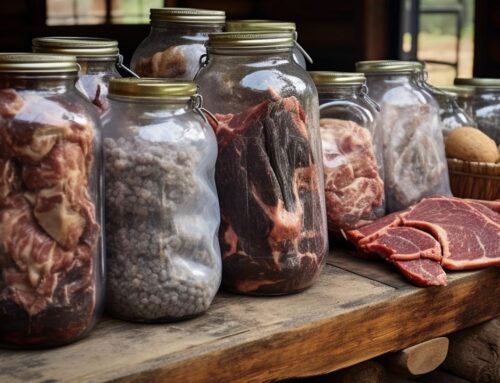In recent years, the world has witnessed a series of unpredictable events, from natural disasters to global pandemics, that have disrupted the supply chains and led to food shortages in various regions. These shortages not only affect the economy but also pose a direct threat to the well-being of families worldwide. As the saying goes, “It’s better to be safe than sorry.” This article aims to equip readers with practical strategies to safeguard their families against potential food shortages. By the end of this comprehensive guide, you’ll have a clear understanding of the causes of food shortages, the importance of being prepared, and actionable steps to ensure your family’s food security. With insights from industry experts, backed by research and statistics, this article serves as a beacon of knowledge in uncertain times.
How to Protect Your Family Against Food Shortages
Table of Contents
- Understanding Food Shortages
- The Importance of Being Prepared
- Strategies to Ensure Food Security
- Frequently Asked Questions
- Final Thoughts
- Sources
Understanding Food Shortages
Food shortages, while not a new phenomenon, have become a pressing concern in the modern era due to a combination of environmental, economic, and political factors. To truly grasp the intricacies of food shortages, it’s essential to delve deeper into its causes, impacts, and the regions most affected. This section aims to provide a comprehensive overview of these aspects, ensuring readers are well-informed about the complexities surrounding food shortages.
Causes of Food Shortages
Natural Disasters
Events such as droughts, floods, hurricanes, and locust invasions can devastate crops, leading to reduced yields and food scarcity. For instance, the 2019 floods in the Midwest of the United States caused a significant decline in corn and soybean production.
Economic Factors
Inflation, trade restrictions, tariffs, and economic downturns can impact the affordability and availability of food. The Venezuelan crisis, marked by hyperinflation, led to severe food and medicine shortages.
Political Instability
Wars, civil unrest, embargoes, and government policies can disrupt food distribution, production, and imports. The Syrian civil war, for example, has caused widespread food insecurity among its population.
Pandemics and Health Crises
Outbreaks like COVID-19 can disrupt the food supply chain due to labor shortages, transportation challenges, and altered consumer demand. The pandemic led to disruptions in meat processing plants and affected global trade.
Impacts of Food Shortages
Health Implications
Food shortages can lead to malnutrition, especially among vulnerable populations like children and the elderly. Malnutrition can result in stunted growth, weakened immunity, and increased susceptibility to diseases.
Socio-economic Consequences
Scarcity can lead to increased food prices, making it inaccessible for many. This can result in social unrest, migration, and even conflicts over resources.
Regions Most Affected
Certain regions, due to their geographical location, political climate, or economic status, are more susceptible to food shortages. Sub-Saharan Africa, parts of Southeast Asia, and war-torn regions like Yemen and Syria have faced recurrent food crises.
The Importance of Being Prepared
In a world where uncertainties abound, preparedness stands as the bedrock of resilience, especially when it comes to food security. The repercussions of being caught off-guard during food shortages can be dire, affecting not only physical health but also mental well-being and community stability. This section delves into the multifaceted importance of being prepared, highlighting the benefits of foresight and the potential pitfalls of complacency.
Why Preparedness Matters
Physical Health and Nutrition
Being prepared ensures that families have access to a balanced diet, even during shortages. This is crucial for maintaining good health, preventing malnutrition, and boosting immunity. A well-stocked pantry can be the difference between a nutritious meal and going to bed hungry.
Mental and Emotional Well-being
Knowing that one is prepared for potential food shortages can provide a sense of security and reduce stress. On the contrary, the panic and anxiety stemming from unpreparedness can be overwhelming, leading to hasty decisions and mental strain.
Economic Implications
Preparedness often involves buying in bulk or investing in long-term food solutions like gardening. This can lead to cost savings in the long run, especially when food prices skyrocket during shortages.
The Psychology of Preparedness
The Role of Fear and Anxiety
While a certain level of fear can be a motivating factor to prepare, excessive anxiety can lead to over-preparation or hoarding. It’s essential to strike a balance, ensuring that preparedness stems from a place of reason rather than panic.
The Power of Proactivity
Being proactive not only ensures physical preparedness but also fosters a mindset of resilience and adaptability. Families that plan ahead tend to face challenges with a problem-solving attitude, making them better equipped to handle crises.
Community and Collective Preparedness
Strengthening Community Bonds
Preparedness is not just an individual endeavor. Communities that prepare together, sharing resources and knowledge, can weather challenges more effectively. Collective efforts like community gardens or shared storage facilities can be beneficial.
Shared Resources and Knowledge
Pooling resources and sharing knowledge can lead to more comprehensive preparedness strategies. For instance, one family might be skilled in gardening, while another might know food preservation techniques. By sharing these skills, the entire community benefits.
Strategies to Ensure Food Security
Ensuring food security for one’s family is a multifaceted endeavor that requires a combination of planning, investment, and community involvement. In the face of potential food shortages, it becomes imperative to adopt strategies that not only provide immediate relief but also pave the way for long-term sustainability. This section offers a comprehensive look into various strategies that can be employed to guarantee food security, from stockpiling essentials to harnessing the power of community collaboration.
Stockpiling Essentials
Choosing the Right Foods
When stockpiling, focus on non-perishable items with long shelf lives such as canned goods, grains, dried fruits, and freeze-dried meals. These foods can be stored for extended periods without losing their nutritional value.
Storage and Rotation
Ensure that your stockpile is stored in a cool, dry place. Regularly check expiration dates and rotate your stock to keep it fresh. Using a first-in, first-out (FIFO) system can be effective.
Home Gardening
Choosing Suitable Crops
Opt for crops that are hardy and well-suited to your local climate. Vegetables like potatoes, carrots, and beans are generally easy to grow and yield substantial produce.
Maximizing Small Spaces
For those with limited space, techniques like container gardening, vertical farming, and hydroponics can be explored. These methods allow for cultivation in urban settings or small yards.
Community Collaboration
Community Gardens
Join or initiate community gardens where neighbors collaborate to cultivate and share crops. This not only ensures a diverse food source but also fosters community spirit.
Bulk Buying Groups
Form groups to buy staples in bulk, leading to cost savings and ensuring a steady supply of essentials. This approach can be especially beneficial during times of rising food prices.
Diversifying Food Sources
Exploring Local Markets
Local farmers’ markets often offer fresh produce and can be a reliable source during supply chain disruptions. Building relationships with local farmers can also lead to opportunities for bulk purchases or community-supported agriculture.
Online and Alternative Retailers
In the digital age, numerous online retailers offer pantry staples, often with options for bulk buying. Additionally, consider exploring alternative retailers like co-ops or specialty stores.
Education and Skill Development
Food Preservation Techniques
Learn methods like canning, freezing, and dehydrating to preserve fresh produce. This not only extends the shelf life of foods but also allows for variety in meals.
Nutritional Planning
Educate yourself on the nutritional needs of your family. This knowledge ensures that even during shortages, meals are balanced and healthful.
Frequently Asked Questions
Final Thoughts
The most crucial takeaway from this article is the significance of foresight and preparedness. In an ever-changing world, the ability to anticipate challenges and act proactively can make all the difference. Ensuring food security for your family is not just about survival but also about maintaining a quality of life during trying times. By implementing the strategies mentioned above, you not only protect your family but also contribute to a resilient community that can weather any storm.







Leave A Comment